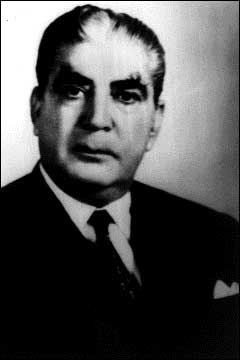![]()
Yahya Khan

General Agha Muhammad Yahya Khan was born at Chakwal in February 1917. His father, Saadat Ali Khan, was actually from Peshawar. After finishing his studies at the Punjab University, Yahya Khan joined the Indian Military Academy at Dehra Dun. He was commissioned in the Indian Army in 1938. His early postings were in the North-West Frontier Province. During World War II, he performed his duties in North Africa, Iraq and Italy. After independence, Yahya Khan played a major role in setting up Pakistan Staff College at Quetta. During the war of 1965, he commanded an infantry division. He was appointed Commander-in-Chief of Pakistan Army in 1966 with the rank of General.
In 1969, when the situation went out of Ayub Khan’s control due countrywide agitation, the president decided to hand over power to the Army Chief, General Yahya Khan. Yahya Khan immediately after getting powers declared Martial Law in the country on March 25 1969 and assumed the title of Chief Martial Law Administrator. He terminated the constitution and dissolved National and Provincial Assemblies and Governments. On March 31, he also became president of the Islamic Republic of Pakistan.
Unlike other military rulers who ruled Pakistan, Yahya Khan was not interested in prolonging his rule. Immediately after taking the charge of the country, Yahya Khan started looking for the options through which he could hand over power to the elected representatives. On March 29 1970, through an Ordinance, he presented an interim constitution: The Legal Framework Order. The Legal Framework Order was actually a formula according to which the forth-coming elections were to be organized. It goes to the credit of Yahya Khan that the first general elections in the history of Pakistan were held during his regime during December 1970.
The trouble started when the results of the elections were announced. Awami League under the leadership of Sheikh Mujeeb-ur-Rahman swept 160 out 165 seats allocated to East Pakistan. However the party failed to get even a single seat from any province of the Western Wing. On the other hand Zulfiqar Ali Bhutto’s Pakistan Peoples Party emerged as the single largest party from Punjab and Sind and managed to win 81 National Assembly seats, all from the Western Wing. This split mandate resulted in political chaos where neither Bhutto nor Mujeeb was ready to accept his opponent as the Prime Minister of Pakistan. When Bhutto and Mujeeb failed to reach an understanding about convening a session of the newly elected National Assembly, the ball fell in Yahya Khan’s court. He handled the situation in a wrong way. He used army and paramilitary forces in East Pakistan to crush the political agitation. This resulted in the beginning of the War between Pakistan and India in the winter of 1971.
Yahya Khan, as president as well as the commander in chief of Pakistan Army, failed to plan the war. This ultimately resulted in the defeat of Pakistan, dismemberment of the country and imprisonment of more than 90,000 Pakistanis. Surrender of Pakistani forces without giving any resistance and the fall of Dacca made Yahya Khan the greatest villain in the country. People from all walks of life started criticizing him and thus he was left with no other option but to hand over the power to the leader of the most popular party of the remaining part of Pakistan, Zulfiqar Ali Bhutto, on December 20 1971. Later Bhutto placed Yahya Khan under house arrest in 1972.